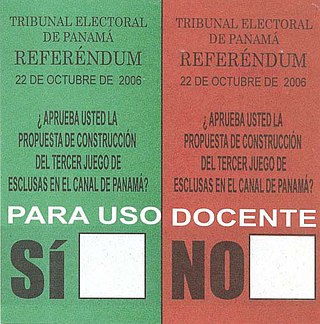Related Research Articles

An election is a formal group decision-making process by which a population chooses an individual or multiple individuals to hold public office.

Proportional representation (PR) refers to any type of electoral system under which subgroups of an electorate are reflected proportionately in the elected body. The concept applies mainly to political divisions among voters. The essence of such systems is that all votes cast – or almost all votes cast – contribute to the result and are effectively used to help elect someone – not just a bare plurality or (exclusively) the majority – and that the system produces mixed, balanced representation reflecting how votes are cast.

Voting is a method by which a group, such as a meeting or an electorate, convenes together for the purpose of making a collective decision or expressing an opinion usually following discussions, debates or election campaigns. Democracies elect holders of high office by voting. Residents of a jurisdiction represented by an elected official are called "constituents", and the constituents who choose to cast a ballot for their chosen candidate are called "voters." There are different systems for collecting votes, but while many of the systems used in decision-making can also be used as electoral systems, any which cater to proportional representation can only be used in elections.
Electoral fraud, sometimes referred to as election manipulation, voter fraud, or vote rigging, involves illegal interference with the process of an election, either by increasing the vote share of a favored candidate, depressing the vote share of rival candidates, or both. It differs from but often goes hand-in-hand with voter suppression. What exactly constitutes electoral fraud varies from country to country, though the goal is often election subversion.

The 2004 European Parliament election was held between 10 and 13 June 2004 in the 25 member states of the European Union, using varying election days according to local custom. The European Parliamental parties could not be voted for, but elected national parties aggregated in European Parliamental parties after the elections.
Early voting, also called advance polling or pre-poll voting, is a convenience voting process by which voters in a public election can vote before a scheduled election day. Early voting can take place remotely, such as via postal voting, or in person, usually in designated early voting polling stations. The availability and time periods for early voting vary among jurisdictions and types of election. The goals of early voting are usually to increase voter participation, relieve congestion at polling stations on election day, and avoid possible discrimination against people with work and travel schedules that may effectively prohibit them from getting to the polls during the hours provided in a single election day.

Elections in Cuba are held at municipal, provincial, and national levels. Cuba is a one-party state, with the Communist Party of Cuba being described as the "superior driving force of the society and the state" in the Constitution of Cuba, and the communist party is the only official political party. Elections in Cuba are not considered democratic because the government does not allow free and fair voting.
Particracy, also known as partitocracy, partitocrazia or partocracy, is a form of government in which the political parties are the primary basis of rule rather than citizens or individual politicians.
In electoral systems, a wasted vote is any vote that does not receive representation in the final election outcome.

Legislative elections were held in Russia on 2 December 2007. At stake were the 450 seats in the 5th State Duma, the lower house of the Federal Assembly. Eleven parties were included in the ballot, including Russia's largest party, United Russia, which was supported by President of Russia Vladimir Putin. Official results showed that United Russia won 64.3% of the votes, the Communist Party of the Russian Federation 11.6%, the Liberal Democratic Party of Russia 8.1%, and Fair Russia won 7.7%, and none of the other parties won enough votes to gain any seats.
In political science, political apathy is a lack of interest or apathy towards politics. This includes voter apathy, information apathy and lack of interest in elections, political events, public meetings, and voting.

Svobodní is a classical liberal and right-libertarian, Eurosceptic political party in the Czech Republic founded in 2009 by Petr Mach, an economist and professor of macroeconomics. Before assuming his position as an MEP, Mach taught economics at VŠFS and VŠEM. The party is led by Libor Vondráček.
smartvote is a Swiss voting advice application (VAA) similar to Stemwijzer in the Netherlands or Wahl-o-Mat in Germany. In Switzerland, smartvote has been offering its services since 2003, and since 2005 it has been operated in collaboration with local partners in other countries.

The Czech Pirate Party often known simply as the Pirates is a liberal progressive political party in the Czech Republic, founded in 2009. The party was founded as a student-driven grassroots movement campaigning for political transparency, civil rights and direct democracy.

Vote Compass is an interactive, online voting advice application developed by political scientists and run during election campaigns. It surveys users about their political views and, based on their responses, calculates the individual alignment of each user with the parties or candidates running in a given election contest.

Early parliamentary elections were held in the Czech Republic on 25 and 26 October 2013, seven months before the constitutional expiry of the elected parliament's four-year legislative term.

Parliamentary elections were held in the Czech Republic on 8 and 9 October 2021. All 200 members of the Chamber of Deputies were elected, with the leader of the resulting government to become the Prime Minister of the Czech Republic. Following the 2017 parliamentary elections, the country had been ruled by a minority government consisting of ANO 2011 (ANO), led by prime minister Andrej Babiš, and the Czech Social Democratic Party (ČSSD), led by interior minister Jan Hamáček, with confidence and supply support from the Communist Party of Bohemia and Moravia (KSČM) until April 2021. The largest opposition party was the Civic Democratic Party (ODS), followed by the Czech Pirate Party. Other parties in the Chamber of Deputies included SPD, TOP 09, STAN, and KDU-ČSL.
The 2019 European Parliament election in the Czech Republic was held on 24 and 25 May 2019, electing the 21 members of the Czech delegation to the European Parliament as part of the European elections held across the European Union.
D21 – Janeček method, also known as Democracy 2.1, is an electoral system applicable for both single-winner and multi-winner voting, which allows voters to cast multiple 'plus' (positive) votes, and, in certain instances, 'minus' (negative) votes. It is similar to approval voting and combined approval voting. The method was developed by Czech mathematician Karel Janeček.

The Central Tibetan Administration, a government-in-exile of Tibet based in India, held an election for its next leader, the Sikyong, in 2021. Candidate Penpa Tsering won the election and succeeded Dr. Lobsang Sangay, who has served for two consecutive terms as Sikyong.
References
- ↑ Vote Match
- ↑ Isotalo, Veikko (2021). "Improving candidate-based voting advice application design". Informaatiotutkimus. 40 (3). doi:10.23978/inf.107215. hdl: 10138/336077 . S2CID 243809212.
- 1 2 Garzia, D.: "The Effects of VAAs on Users’ Voting Behaviour: An Overview", in Cedroni, L. & Garzia, D. (eds.):Voting Advice Applications in Europe: The State of the Art, Napoli: ScriptaWeb, 2010.
- ↑ Cedroni, Lorella: "Voting Advice Applications in Europe: A Comparison" in Cedroni, L. & Garzia, D. (2010)
- ↑ "Plausible · volebnikalkulacka.cz". plausible.io. Retrieved 9 May 2023.
- ↑ "Voting result | volby.cz". volby.cz. Retrieved 9 May 2023.
- ↑ Germann, Micha; Gemenis, Kostas (2019). "Getting Out the Vote with Voting Advice Applications" (PDF). Political Communication. 36: 149–170. doi:10.1080/10584609.2018.1526237. S2CID 149640396.
- ↑ "Taking the Money Out of Politics Archives".
- ↑ Wall Street Journal: 'Welcome to the Election Compass'
- ↑ Israel Democracy Institute
- ↑ Andranik Tangian, Analytical Theory of Democracy: History, Mathematics and Applications, p. 356, Springer Nature, 2020 ISBN 3030396916.
- ↑ "Welcome to Vote Match", votematch.org.uk, retrieved 11 November 2022.
- ↑ "Partitest och valmaskiner - Institutet för de inhemska språken".
- ↑ "Lista vaalikoneista eduskuntavaaleissa 2023". 21 February 2023.
- “Voting Aid Applications between charlatanism and political science: the effect of statement selection”, University of Antwerp.
- Cedroni, L. & Garzia, D. (eds.): Voting Advice Applications in Europe: The State of the Art, Napoli: ScriptaWeb, 2010.